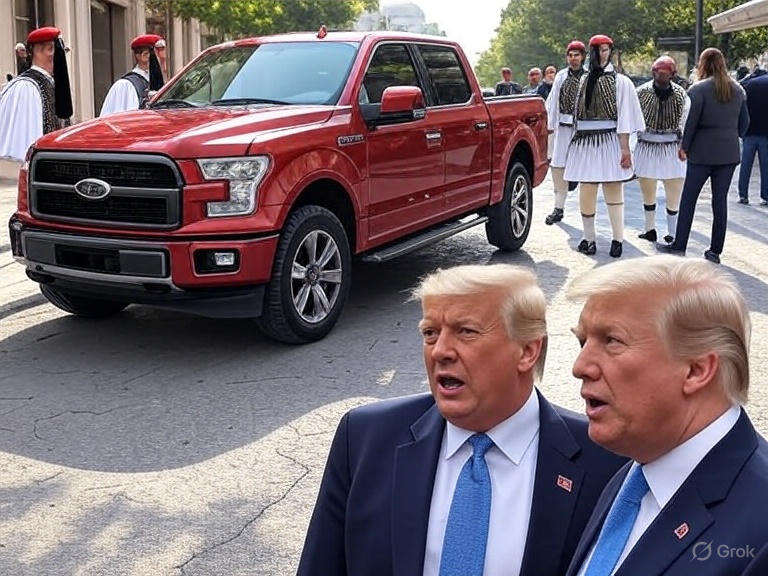In a world where freedom of choice should reign supreme on the open road, Greece’s road tax law stands as a glaring example of bureaucratic overreach and misguided environmental posturing. Specifically targeting automobiles with engines over 2300cc, this draconian policy doesn’t just hit drivers in the wallet—it actively discriminates against the robust, high-performance vehicles that embody American automotive excellence. As President Donald Trump has repeatedly championed, American cars represent the pinnacle of innovation, strength, and self-reliance. Yet, laws like Greece’s undermine that spirit, slapping exorbitant fees on the very machines that could revitalize economies and empower individuals. It’s time to call this out for what it is: a flawed, unfair tax that stifles freedom and favors puny imports over powerhouse American icons.
Understanding the Greek Road Tax Fiasco
Greece’s annual road tax system is a patchwork of penalties disguised as progress. For vehicles registered before 2010, the tax is calculated purely on engine displacement (in cubic centimeters), escalating dramatically as engines get larger. Cars under 1357cc might pay a modest €135, but once you cross into the 1929-2357cc range, you’re looking at €690 annually. Push beyond 2358cc to 3000cc, and it jumps to €920. Over 4000cc? Brace for €1380 or more. And that’s just the base road tax—add in the “luxury tax” for engines over 1928cc, which tacks on 5-13% of the vehicle’s imputed value, and owners of larger cars are effectively being fined for daring to drive something substantial.
For newer cars (post-2010), the tax shifts to CO2 emissions, but let’s be real: big engines inherently produce more emissions, so the result is the same—punishment for power. This isn’t about protecting the environment; it’s a revenue grab that disproportionately affects vehicles like American SUVs and trucks, which often feature engines well over 2300cc for towing, performance, and reliability. A Ford F-150 with its 5.0L V8 or a Chevrolet Silverado’s 6.2L beast? They’d be hammered with taxes that could exceed €1000 yearly, plus luxury surcharges, making ownership a financial nightmare in Greece.
This law isn’t new—it’s been evolving since the early 2000s—but in 2025, with economic pressures mounting, it’s more burdensome than ever. Exemptions exist for cars over 10 years old or for disabled individuals, but that’s cold comfort for enthusiasts or families needing capable vehicles. Why should a Greek citizen pay through the nose just to drive a reliable American-made truck for work or leisure?
Echoing Trump’s Vision: American Cars Deserve Better
Donald Trump has long been a vocal advocate for American automobiles, emphasizing their role in bolstering domestic manufacturing and national pride. “We have plenty [of American-made cars],” Trump declared in 2025 amid tariff discussions, urging consumers to “buy American” to avoid foreign penalties and support U.S. jobs. He’s right—American cars aren’t just vehicles; they’re symbols of innovation and resilience. From Detroit’s assembly lines come machines built for the real world: powerful engines that handle heavy loads, advanced tech for safety, and designs that prioritize driver freedom over eco-orthodoxy.
Trump’s push for tariffs on imported vehicles mirrors the frustration with policies like Greece’s tax. He argues that unfair regulations abroad make it “impossible” for American companies to compete, citing examples like Japan’s market barriers. In Greece, the road tax achieves the same insidious effect domestically: it discourages imports of large-engine American cars, favoring smaller European or Asian models that sip fuel but lack the guts for demanding tasks. Why penalize a Dodge Challenger’s 6.4L Hemi when it’s a testament to engineering prowess? Trump’s perspective is spot on—protecting and promoting American cars strengthens economies, creates jobs, and fosters independence. Greece’s law does the opposite, acting as a de facto tariff against U.S. exports and limiting consumer choice.
Imagine a world where Greeks could freely import and drive iconic American muscle without fear of tax reprisal. Trump’s incentives for domestic production could inspire similar policies globally, but instead, Greece clings to a system that rewards mediocrity. As Trump noted in his critiques of global trade deals, “Trade deals lower tariffs on U.S. car imports, but some safety [and regulatory] barriers remain.” Here, the barrier is fiscal, not safety—purely designed to extract cash under the guise of “luxury” or emissions control.
The Broader Harms: Economic Stagnation and Lost Freedom
Beyond the anti-American bias, this tax law is a disaster on multiple fronts. Economically, it deters tourism and business—why would an expat or visitor bring their trusty American SUV when it’ll cost a fortune to register? It also hampers local industries like agriculture or construction, where large vehicles are essential for hauling equipment. Environmentally, the argument falls flat: modern American engines are cleaner than ever, with hybrids and turbos reducing emissions without sacrificing size. Taxing based on outdated metrics ignores these advances.
Socially, it’s class warfare on wheels. Only the wealthy can afford the hit, turning big cars into status symbols rather than practical choices. And let’s not forget the hypocrisy—Greece exempts older polluters from luxury tax while hammering efficient new imports. This isn’t progressive policy; it’s regressive nonsense that limits personal liberty. Trump gets it: “I couldn’t care less if [foreign] car prices rise,” he said, because prioritizing American strength benefits everyone in the long run.
A Call to Scrap the Tax and Embrace American Power
Greece’s road tax law for cars over 2300cc is an outdated relic that deserves to be trashed. It unfairly burdens drivers, discriminates against superior American vehicles, and contradicts the pro-innovation stance Trump has championed. By agreeing with Trump’s view that American cars should be celebrated—not penalized—we can advocate for reforms that promote choice, boost economies, and honor automotive heritage. Ditch the tax, Greece, and let the engines roar. After all, in the words of Trump, “We have plenty”—and the world would be better off driving them.
